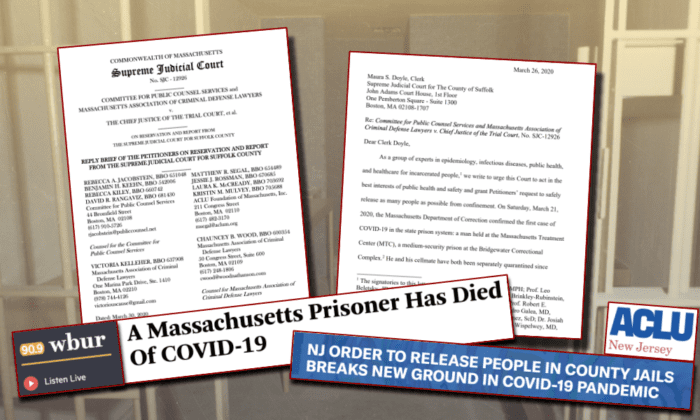
To keep people locked up despite the looming threat of coronavirus, officials are claiming prisoners lack community ties. Advocates and family members say that’s not the case.
With fears about coronavirus increasing along with infection rates across age groups and regions, prison activists, disease experts, legislators, and attorneys are sounding alarms about the dangers faced by a specific, often forgotten group—those who are incarcerated.
More than 75 medical professionals and public health experts from Harvard T.H. Chan School of Public Health and Harvard Medical School wrote a letter on March 31 to Massachusetts Governor Charlie Baker, urging him to immediately release a number of prisoners because of the potential deadly spread of COVID-19.
Emergency decarceration legislation filed by Northampton state Rep. Lindsay Sabadosa (and sponsored by 28 other legislators) warns that a law to release prisoners is “necessary for the immediate preservation of the public safety and health.”
And a lawsuit filed on March 30 by the Committee for Public Counsel Service (CPCS) and the Massachusetts Association for Criminal Defense Lawyers (MACDL) asks the Supreme Judicial Court (SJC) to grant “immediate relief to reduce incarceration levels in Massachusetts.” According to those attorneys, “Saying that Massachusetts prisoners will be okay because they (now) have free soap, as the Sheriffs contend, is like arguing that the Titanic’s passengers might have been fine if they’d taken swimming lessons. No. The only safe places were off of the ship.”
And yet, Massachusetts prisoners are still at sea.
Attorney Keren Goldenberg, who is keeping records of all reported cases, said, “As of April 1, there were 21 [Massachusetts] prisoners and 14 staff confirmed with COVID-19.” Goldenberg acknowledged anecdotes from other lawyers suggesting there are many more cases as well. In addition to the state prisons—Mass Treatment Center (MTC) at Bridgewater, MCI Framingham, and MCI Shirley—there are cases at county jails in Essex, Hampden, Norfolk, Middlesex, and Plymouth. On April 1, WBUR reported on a staffer with COVID-19 at Souza-Baranowski Correctional Center in Shirley. The numbers keep rising daily. On April 2, the first Massachusetts prisoner died from coronavirus, a man in his fifties with underlying health conditions.
Other states have acted. Alexander Shalom, director of Supreme Court advocacy at the American Civil Liberties Union in New Jersey (ACLU-NJ), said the Garden State released 690 people from county jails. New Jersey Chief Justice Stuart Rabner signed an order that directs their temporary release during the COVID-19 public health crisis.
“At the conclusion of the emergency,” the ACLU reported, “judges will determine whether any sentences should be commuted” (given a lesser penalty and thus less time). Shalom added, “There are thousands of people in New Jersey whose continued incarceration would put their lives, correction officers’ lives … and indeed everyone in New Jersey at risk.”
The Prison Policy Initiative reports that in Ohio, on a single day, judges released 38 people from the Cuyahoga County Jail. As of this writing, releases of prisoners have taken place in California, Colorado, Florida, Texas, Washington, Arizona, South Carolina, Utah, Louisiana, Pennsylvania, New York, and even Alabama, a state known for its particularly brutal prison policies.
While the SJC will most likely rule on the lawsuit this week, pushback has specifically come from county sheriffs and the Mass Department of Correction. One point of contention that will endure no matter how the lawsuit ends regards whether people exiting prisons and jails have a place to go, and therefore perhaps are better off behind bars.
At a March 26 press conference, a reporter asked Governor Charlie Baker about the possibility of ill prisoners getting out on “medical parole.” He answered: “The thing you have to remember about medical parole is that they need to have somewhere to go in the community, okay? And if they don’t have somewhere to go, they are probably better off, in many cases, where they are.”
Such statements are untrue, according to many formerly incarcerated people and their families. To drive their point home, more than 40 relatives of current prisoners signed a letter to the SJC in support of the lawsuit, expressing how much they feared for their incarcerated loved ones’ health and how much they wanted them home. N.R. from Norfolk County wrote:
My nephew is housed at MTC where there have been confirmed cases on his unit. We fear for his health, as they are not providing the proper items to prevent the spread of the virus even after so many confirmed cases…The anxiety of knowing our loved ones are sitting ducks waiting to be infected is unbearable. They are loved, and have families willing and waiting with open arms and proper shelter for them.
“Just because someone is locked up as a pre-sentenced detainee does not immediately imply that they are unloved, uncared for, or homeless and forgotten,” Barbara A. Jaroz wrote on behalf of a loved one. “Not only is David loved and cared for but he has a home and a job to return to.”
In an amicus letter, attorneys from Prisoners’ Legal Services (PLS) wrote, “Attempts to portray prisoners as rootless and lacking family ties are destructive. Just this year, PLS received over one hundred phone calls from family members concerned for their incarcerated loved ones. In recent days and weeks, we have spoken to countless family members who are begging for the release of their loved ones, both for their own health and safety and to provide critical support that they cannot provide while incarcerated.”
Canez Tout-Puissant, a prisoner at Old Colony Correctional Center in Bridgewater with breathing issues, said he is scared that if and when the virus comes to the facility, he will be at a high risk. “I wrap up in about a year, and would much rather be at home than in here because I could do a better job at self-quarantine,” he said in an interview. “Outsiders bring it in here, so by the time they realize what’s going on, I could get it. My wife and I could spend less money quarantining myself on the street than the state pays to do it for me and everyone would be safer for it.”
While the idea put forth by sheriffs is that releasing people “may result in harm to the public,” medical professionals say inadequate healthcare in prisons and jails is “threatening lives.” In a March 26 court filing, a “group of experts in epidemiology, infectious diseases, public health, and healthcare for incarcerated people” urged the Massachusetts Supreme Judicial Court “to act in the best interests of public health and safety” and grant the request of the lawsuit (filed by CPCS and MACDL). They urge the release of as many as “practicable,” since “those who are incarcerated are even more vulnerable to catching COVID-19 and to becoming seriously ill or dying from it.” “Infection control in jails and prisons,” they wrote, “is nearly impossible.”
Attorney Ruth Greenberg, writing about her clients at MCI Shirley, noted, “The social calculus has changed. … James Judge has Stage Four metastatic prostate cancer and only months to live and his mother is willing to take him home. [Such prisoners] present no risk to the public if released despite convictions of crimes against a person, and great risk to the public and to DOC staff if infected with COVID-19 while confined. They incur greater cost and create greater risk to society inside than out.”
Mallory Hanora, executive director of Families for Justice as Healing, took exception to comments made by Hampshire County Sheriff Patrick Cahillane. In a guest column for the Daily Hampshire Gazette, Cahillane portrayed many of the 200 men in his charge as homeless, writing, “At the Jail and House of Correction, they have 24/7 access to medical care, three meals a day, and roof over their head, in a humane, noncrowded situation.”
“Most people have loved ones they can live with,” Hanora said. “Their loved ones have been actively demanding release for weeks. For those people who don’t have homes to go to—the choice is not incarceration or the street. That’s a false choice. The choice is between leaving people in jails and prisons to get sick and die or doing something better and safer. The state has the resources, if we use them right. Towns, cities, and the state can give people emergency funds, hotel vouchers, and get creative with dorms, churches, community centers, and vacant housing where people would have enough space to spread out.”
Getting creative, Los Angeles County Sheriff Alex Villanueva is using public recreation centers to safely support those freed due to concerns around COVID-19. “We’re not going to keep them in jail because they don’t have a home,” Villanueva said.
Bob Marra, a case manager for Cambridge Health Alliance who works in re-entry at the Middlesex House of Correction, said that some states are considering using vacated college dorms or hotels for prisoners needing to quarantine after being released. And in Indiana, a network of formerly incarcerated people and volunteers are urging their governor to use vacant motels.
“Certainly there were some who didn’t have places to go, and we need to address that, but we shouldn’t be leaving people in a jail that we know is a petri dish just because we don’t know if they have a place to go,” Shalom, the ACLU attorney, said about these situations.
In Mass, on April 2, a group of 25 lawmakers urged Governor Baker to decarcerate, stressing that “the Material Aid and Advocacy Program (MAAP), whose mission is to support and empower community members experiencing homelessness or living in poverty,” could help find housing for those who need it. Writing via email from Old Colony in Bridgewater, Shawn Fisher, a 47-year-old lifer who with asthma, seconded the sentiment. Letting prisoners go home, he wrote, is “one local unbiased commonsense approach to a worldly pandemic.”
At the time of this writing, Governor Baker has not responded.
This article is syndicated by the Boston Institute for Nonprofit Journalism’s Pandemic Democracy Project. Contact pdp@binjonline.org for more information.
HELP DIGBOSTON WEATHER THIS STORM AND CONTINUE PROVIDING ARTICLES LIKE THIS ONE
Jean Trounstine is a writer, activist, and professor whose latest book is Boy With a Knife: A Story of Murder, Remorse, and a Prisoner’s Fight for Justice. She is on the steering committee of the Coalition for Effective Public Safety.

